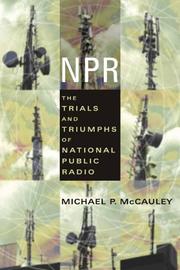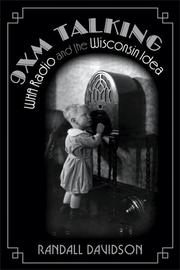| Listing 1 - 10 of 10 |
Sort by
|

ISBN: 2271058430 2271127866 9782271058430 Year: 2001 Publisher: Paris: CNRS,
Abstract | Keywords | Export | Availability | Bookmark
 Loading...
Loading...Choose an application
- Reference Manager
- EndNote
- RefWorks (Direct export to RefWorks)
« Une émission sur France Culture n’est ni un cours, ni de la publicité pour vendre un livre », déclare une productrice. Radio du service public, consacrée à la culture savante et artistique, France Culture ne s’apparente ni à une radio universitaire, ni à un faire-valoir des productions culturelles. Elle suppose donc une mise en forme qui construise une place à l’auditeur. Ni tribunal de la culture, ni haut-parleur pour ceux qui y parlent, elle est un média, irrémédiablement contenu et contenant, énoncé et énonciation. Et son histoire est aussi celle de la socialisation progressive des médias. À partir d’une enquête de terrain, cet ouvrage constitue une approche sociologique originale par observation, entretien et données statistiques. Il emprunte aux registres de la sociologie du travail, des professions, des médias et aux apports récents de l’action située. La production et la réalisation radiophoniques constituent un travail collectif en situation, une série d’organisations-par-projets au sein d’une institution stable et de groupes professionnels structurés, D’une part, le cadre même de la production radiophonique est un cadre qui se construit plutôt qu’il n’est déjà construit, d’autre part, ceux qui font France Culture revendiquent une professionnalité et une autonomie face au domaine scientifique. Il en découle des formes de collaboration et des identités professionnelles propres à une activité tantôt conçue comme intellectuelle, tantôt comme journalistique ou bien encore artistique. L’ouvrage analyse le profil et le niveau d’intégration des personnels dans l’organisation — statuts, trajectoires, investissements et idéologies professionnelles — mais aussi l’activité professionnelle — recréation à partir de matériaux enregistrés, lieux d’activité, relations interpersonnelles, savoir-faire techniques, négociations autour de la fabrication du produit sonore. Que ce soit dans ses créations sonores ou dramatiques, dans ses émissions en direct ou dans ses…
Public radio --- Radio broadcasters --- Public radio - France. --- Radio broadcasters - France. --- Radio-France. --- Broadcasters --- Radio personalities --- Non-commercial radio --- Noncommercial radio --- Public broadcasting --- Radio broadcasting --- Public service radio programs --- France-Culture --- radio --- média --- art radiophonique

ISBN: 1572733497 Year: 2001 Publisher: Cresskill, N.J. Hampton Press
Abstract | Keywords | Export | Availability | Bookmark
 Loading...
Loading...Choose an application
- Reference Manager
- EndNote
- RefWorks (Direct export to RefWorks)
Sociology of minorities --- Mass communications --- United States --- Canada --- Public radio --- -Ethnic radio broadcasting --- -Democracy --- -Public radio --- -Self-government --- Political science --- Equality --- Representative government and representation --- Republics --- Minority radio broadcasting --- Ethnic broadcasting --- Radio broadcasting --- Community radio --- Non-commercial radio --- Noncommercial radio --- Public broadcasting --- Public service radio programs --- Democracy --- Ethnic radio broadcasting --- United States of America

ISBN: 0231121601 0231509952 Year: 2005 Publisher: New York Columbia University Press
Abstract | Keywords | Export | Availability | Bookmark
 Loading...
Loading...Choose an application
- Reference Manager
- EndNote
- RefWorks (Direct export to RefWorks)
The people who shaped America's public broadcasting system thought it should be "a civilized voice in a civilized community"-a clear alternative to commercial broadcasting. This book tells the story of how NPR has tried to embody this idea. Michael P. McCauley describes NPR's evolution from virtual obscurity in the early 1970's, when it was riddled with difficulties-political battles, unseasoned leadership, funding problems-to a first-rate broadcast organization. The book draws on a wealth of primary evidence, including fifty-seven interviews with people who have been central to the NPR story, and it places the network within the historical context of the wider U.S. radio industry. Since the late 1970's, NPR has worked hard to understand the characteristics of its audience. Because of this, its content is now targeted toward its most loyal listeners-highly educated baby-boomers, for the most part-who help support their local stations through pledges and fund drives.
National Public Radio (U.S.) --- Public radio --- United States --- Radio broadcasters --- Non-commercial radio --- Noncommercial radio --- Public broadcasting --- Radio broadcasting --- Public service radio programs --- NPR --- Association of Public Radio Stations (U.S.) --- WBEZ (Radio station : Chicago, Ill.) --- National Story Project (U.S.) --- KCRW (Radio station : Santa Monica, Calif.) --- WGBH (Radio station : Boston, Mass.)

ISBN: 0299218708 0299218732 1282270222 9786612270222 9780299218737 9780299218706 9781282270220 Year: 2006 Publisher: Madison, Wis. : University of Wisconsin Press, Terrace Books,
Abstract | Keywords | Export | Availability | Bookmark
 Loading...
Loading...Choose an application
- Reference Manager
- EndNote
- RefWorks (Direct export to RefWorks)
PERFORMING ARTS --- General --- Public radio --- Educational radio stations --- Journalism & Communications --- Radio & TV Broadcasting --- History --- History. --- WHA (Radio station : Madison, Wis.) --- Non-commercial radio --- Noncommercial radio --- University of Wisconsin--Extension. --- Radio in education --- Radio stations --- Public broadcasting --- Radio broadcasting --- Public service radio programs --- E-books

ISBN: 0275963586 0313003262 9780313003264 9780275963583 9798400630491 Year: 1999 Publisher: Westport, Conn. : London : Praeger, Bloomsbury Publishing,
Abstract | Keywords | Export | Availability | Bookmark
 Loading...
Loading...Choose an application
- Reference Manager
- EndNote
- RefWorks (Direct export to RefWorks)
A discussion of National Public Radio in America and its prospects for survival and success. Beginning with a description of events that led to the creation of NPR, it examines the relationship between NPR and its affiliate stations and how the struggles over funding have affected its agenda.
Public radio - United States. --- Journalism & Communications --- Radio & TV Broadcasting --- Public broadcasting --- Public radio --- National Public Radio (U.S.) --- Non-commercial radio --- Noncommercial radio --- NPR --- Radio broadcasting --- Public service radio programs --- Association of Public Radio Stations (U.S.) --- WBEZ (Radio station : Chicago, Ill.) --- National Story Project (U.S.) --- KCRW (Radio station : Santa Monica, Calif.) --- WGBH (Radio station : Boston, Mass.)
Book
ISBN: 9789189471948 Year: 2010 Publisher: Göteborg NORDICOM
Abstract | Keywords | Export | Availability | Bookmark
 Loading...
Loading...Choose an application
- Reference Manager
- EndNote
- RefWorks (Direct export to RefWorks)
Public broadcasting. --- Public radio. --- Public television. --- Mass communications --- Public broadcasting --- Public radio --- Public television --- #SBIB:309H400 --- Non-commercial television --- Noncommercial television --- Television broadcasting --- Public service television programs --- Non-commercial radio --- Noncommercial radio --- Radio broadcasting --- Public service radio programs --- Non-commercial broadcasting --- Noncommercial broadcasting --- Broadcasting --- Media en publieksgroepen: algemene werken --- Media --- Openbare omroep --- Omroep --- Inspraak --- Overheidsbeleid
Book
ISBN: 3891580606 Year: 1991 Publisher: Berlin Vistas
Abstract | Keywords | Export | Availability | Bookmark
 Loading...
Loading...Choose an application
- Reference Manager
- EndNote
- RefWorks (Direct export to RefWorks)
Public radio --- #SBIB:309H1513 --- 316.774.12:654.195 --- 316.774.12:654.195 Radiowezen: communicatiepolitieke aspecten--(communicatiesociologie) --- Radiowezen: communicatiepolitieke aspecten--(communicatiesociologie) --- Non-commercial radio --- Noncommercial radio --- Public broadcasting --- Radio broadcasting --- Public service radio programs --- Geschiedenis en/of organisatie van de radio en/of televisie: algemeen en per land (met inbegrip van de rol van de omroep in de ontwikkelingsproblematiek) --- Mass communications
Book
ISBN: 0773599819 0773599800 9780773548091 0773548092 9780773548107 0773548106 9780773599819 9780773599802 Year: 2016 Publisher: Montreal, [Quebećbec] : McGill-Queen's University Press,
Abstract | Keywords | Export | Availability | Bookmark
 Loading...
Loading...Choose an application
- Reference Manager
- EndNote
- RefWorks (Direct export to RefWorks)
Before screens could be stared at, listeners lent their ears to radio, and Canadian listeners were as avid as any. In Canada before Television, Len Kuffert takes us back to the earliest days of broadcasting, paying particular attention to how programs were imagined and made, loved and hated, regulated and tolerated. At a time when democracy stood out as a foundational value in the West, Canada’s private stations and the CBC often had conflicting ideas about what should or could be broadcast. While historians have documented the nationalist and culturally aspirational motives of some broadcasters, the story behind the production of programs for both broad and specialized audiences has not been as effectively told. By interweaving archival evidence with insights drawn from secondary literature, Canada before Television offers perspectives on radio’s intimate power, the promise and challenge of US programming and British influences, the regulation of taste on the air, shifting and varied musical appetites, and the difficulties of knowing what listeners wanted. While this mixed system divided Canadians then and now, the presence of more than one vision for the emerging medium made the early years of broadcasting in Canada more culturally democratic for listeners who stood a better chance of getting both what they already liked and what they might come to like. Canada before Television offers an insightful look at the place of radio and debates about programming in the development of a cultural democracy.
Radio broadcasting --- Radio broadcasting policy --- Radio broadcasting and state --- Broadcasting policy --- Radio --- Radio industry and trade --- Broadcasting --- Mass media --- History. --- Social aspects --- Government policy --- Public radio --- Radio audiences --- Radio programs --- Programs, Radio --- Radio shows --- Shows, Radio --- Radio scripts --- Audiences, Radio --- Radio listeners --- Audiences --- Non-commercial radio --- Noncommercial radio --- Public broadcasting --- Public service radio programs --- History --- Rating&delete& --- Rating --- E-books
Book
ISBN: 3030800199 3030800180 Year: 2021 Publisher: Cham, Switzerland : Springer,
Abstract | Keywords | Export | Availability | Bookmark
 Loading...
Loading...Choose an application
- Reference Manager
- EndNote
- RefWorks (Direct export to RefWorks)
Public radio --- History. --- National Public Radio (U.S.) --- Non-commercial radio --- Noncommercial radio --- Public broadcasting --- Radio broadcasting --- Public service radio programs --- NPR --- Association of Public Radio Stations (U.S.) --- WBEZ (Radio station : Chicago, Ill.) --- National Story Project (U.S.) --- KCRW (Radio station : Santa Monica, Calif.) --- WGBH (Radio station : Boston, Mass.)
Book
ISBN: 9780253356772 0253356776 9780253223470 0253223474 0253005434 9780253005434 Year: 2011 Publisher: Bloomington : Indiana University Press,
Abstract | Keywords | Export | Availability | Bookmark
 Loading...
Loading...Choose an application
- Reference Manager
- EndNote
- RefWorks (Direct export to RefWorks)
Human Rights and African Airwaves focuses on Nkhani Zam'maboma, a popular Chichewa news bulletin broadcast on Malawi's public radio. The program often takes authorities to task and questions much of the human rights rhetoric that comes from international organizations. Highlighting obligation and mutual dependence, the program expresses, in popular idioms and local narrative forms, grievances and injustices that are closest to Malawi's impoverished public. Harri Englund reveals broadcasters' everyday s
Radio broadcasting --- Radio broadcasting, Chewa --- Public radio --- Human rights in mass media. --- Ethnology --- Social aspects --- Malawi Broadcasting Corporation. --- Nkhani Zam'maboma (Radio program). --- Malawi --- Social conditions. --- Human rights in mass media --- #SBIB:309H1513 --- #SBIB:39A73 --- #SBIB:39A8 --- Chewa radio broadcasting --- Non-commercial radio --- Noncommercial radio --- Public broadcasting --- Public service radio programs --- Mass media --- Radio --- Radio industry and trade --- Broadcasting --- Geschiedenis en/of organisatie van de radio en/of televisie: algemeen en per land (met inbegrip van de rol van de omroep in de ontwikkelingsproblematiek) --- Etnografie: Afrika --- Antropologie: linguïstiek, audiovisuele cultuur, antropologie van media en representatie --- MBC --- Nkhani Zam'maboma (Radio program) --- News from the districts (Radio program) --- Dziko la Malaŵi --- GOM (Malawi) --- Ma-la-wei --- Malaui --- Malavi --- Maraui --- Republic of Malaŵi --- República de Malawi --- Republik Malawi --- Малави --- マラウイ --- Nyasaland
| Listing 1 - 10 of 10 |
Sort by
|

 Search
Search Feedback
Feedback About UniCat
About UniCat  Help
Help News
News